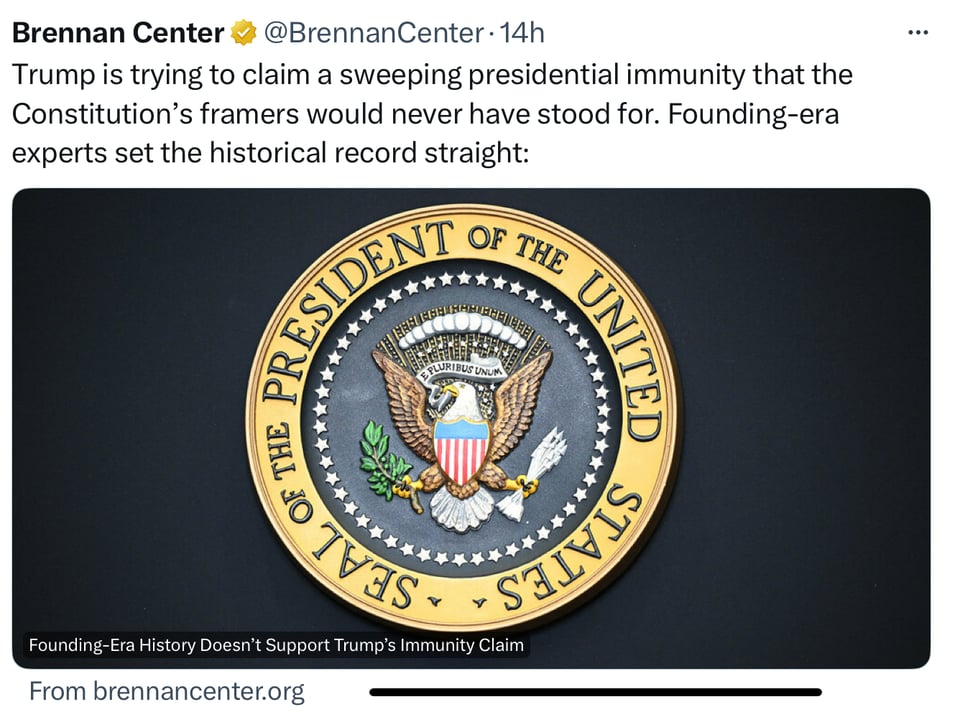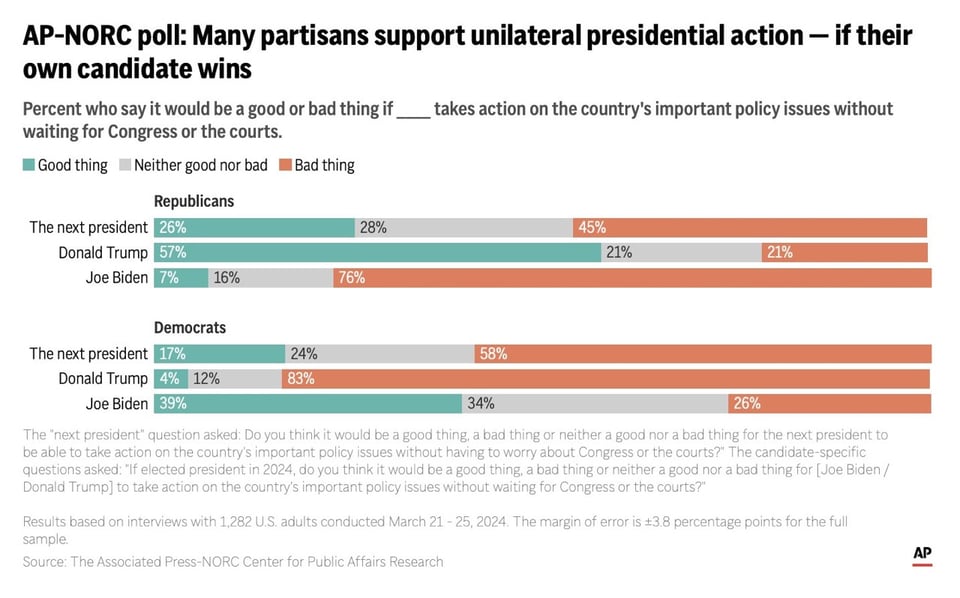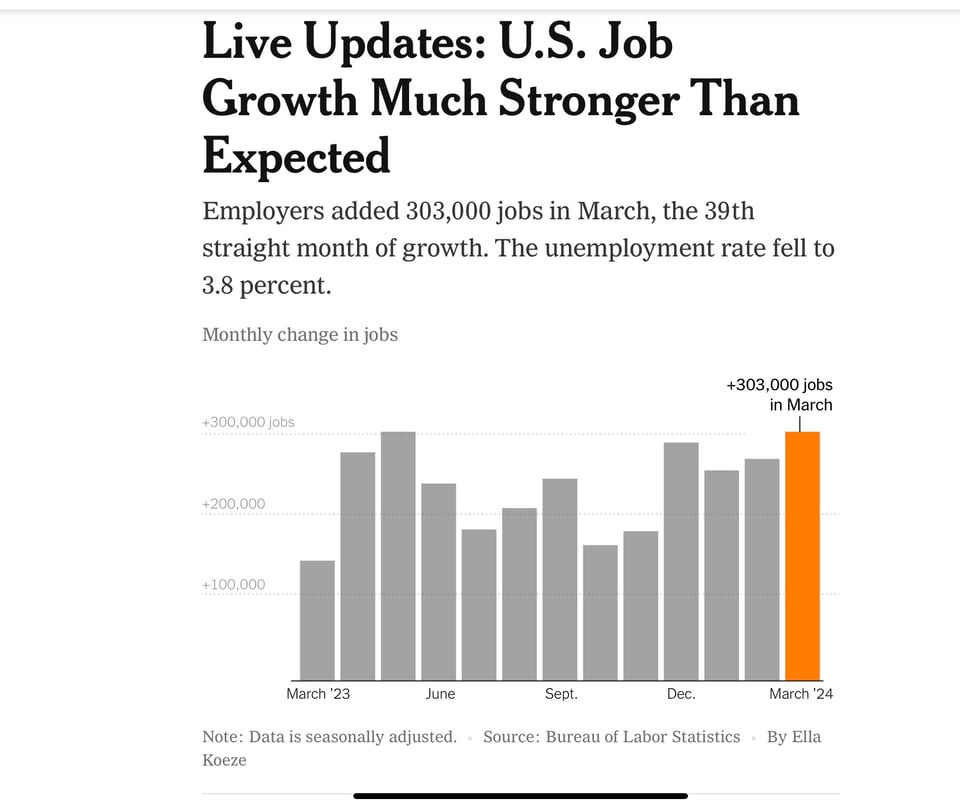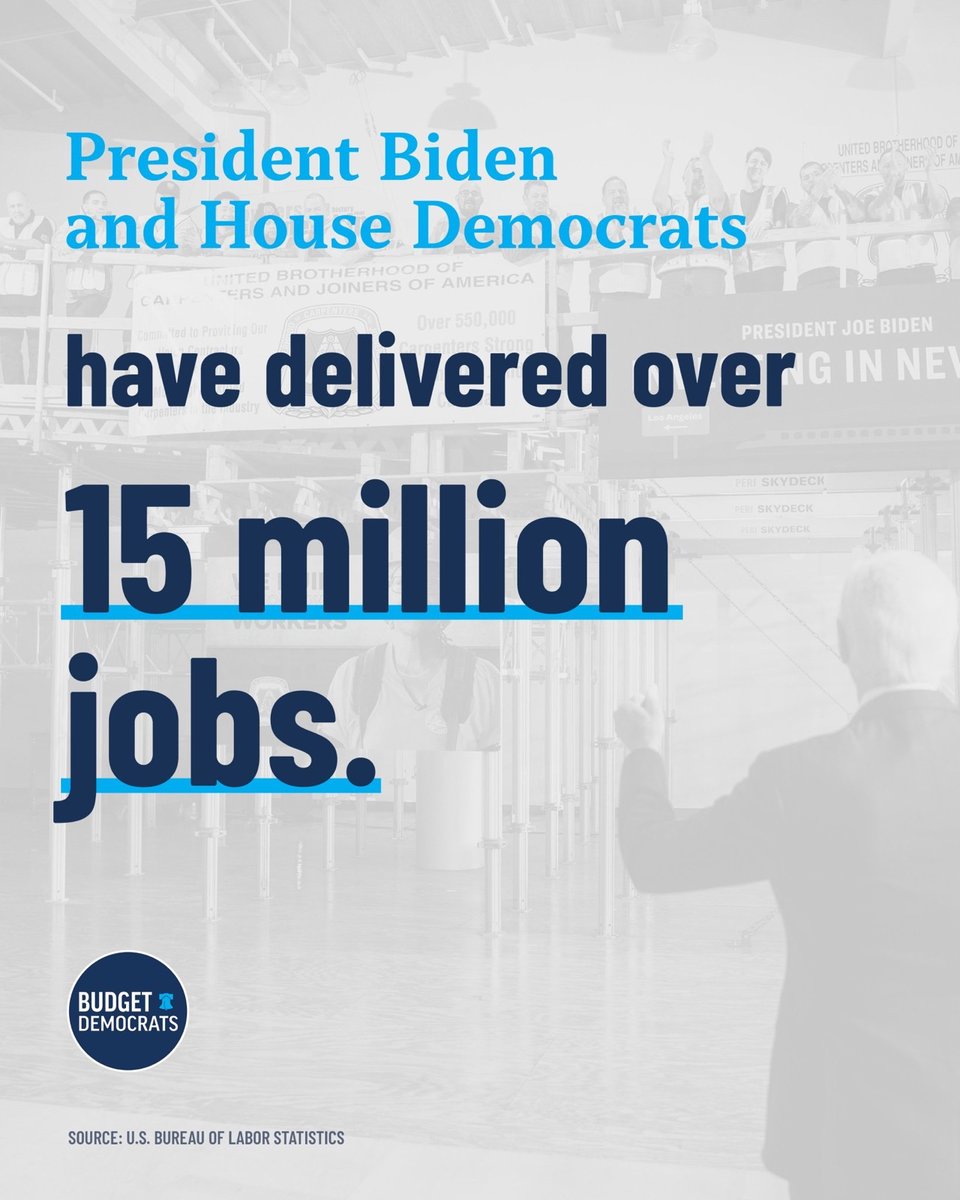Saturday, April 6, 2024. Annette’s News Roundup.
I think the Roundup makes people feel not so alone.
To read an article excerpted in this Roundup, click on its blue title. Each “blue” article is hyperlinked so you can read the whole article.
Please feel free to share.
Invite at least one other person to subscribe today! https://buttondown.email/AnnettesNewsRoundup
____________________________________________
Here is an article from the Brennan Center, offering a discussion on Presidential immunity as claimed by Trump.
This important topic is likely going to claim our attention in the weeks/months to come.
Founding-Era History Doesn’t Support Trump’s Immunity Claim.
Historians Rosemarie Zagarri and Holly Brewer explain the anti-monarchical origins of the Constitution and the presidency.
PUBLISHED: February 21, 2024

The federal courts are grappling with former President Trump’s claim that presidents are immune from criminal prosecution for acts they committed while in office. In February, the DC Circuit Court of Appeals ruled that Trump can indeed face charges for attempts to overturn the 2020 election results, affirming a December ruling from a federal trial court. All eyes have now turned to the U.S. Supreme Court.
The courts shouldn’t view themselves as bound by the thinking of the earliest generations of Americans when assessing Trump’s claims. But, on novel issues like this, history can be a valuable guide for judges and the public alike, providing insights into the important ideas that first shaped the limits of presidential power and the enduring values that have come to define the rule of law under the Constitution.
The Brennan Center asked founding-era historians Rosemarie Zagarri and Holly Brewer to comment on some of the historical dimensions of Trump’s criminal immunity defense.
Zagarri is Distinguished University Professor and professor of history at George Mason University. Brewer is the Burke Chair of American Cultural and Intellectual History and associate professor of history at the University of Maryland. Both are members of the Historians Council on the Constitution, a new Brennan Center initiative that seeks to address misuses and mischaracterizations of history in major constitutional debates.
____________________________________________
Trump argues that he cannot be prosecuted for actions he undertook when he was president. What would the framers have thought of this claim?
Rosemarie Zagarri: It’s highly unlikely the founding generation would have believed that a former president was immune from punishment for committing crimes, especially the kinds of crimes Trump is accused of committing. One of the defining features of a constitutional government is that all people, whatever their station or office, must be subject to the same laws. As Thomas Paine said in Common Sense, “[I]n America THE LAW IS KING. . . . [A]s in absolute governments the King is law, so in free countries the law ought to be King.”
Trump is attempting to act as a king above the law. Alexander Contee Hanson of Maryland, writing as “Aristides,” was confident that any president who engaged in bribery, corruption, or other crimes would have to face the legal consequences of his actions. “Like any other individual,” Hanson said, “he is liable to punishment.” In contrast to a monarch, the president, according to Alexander Hamilton, is not “sacred and inviolable.” Hamilton said that the president is as much subject to punishment as corrupt governors from states such as New York, Maryland, and Delaware were at the time of the founding.
The president must swear an oath to “preserve, protect and defend the Constitution of the United States.” Trump is charged with taking actions designed to undermine the constitutional process enabling the peaceful transfer of power — and thus violating the law. Accordingly, he should be liable for his actions. It is ludicrous to argue, as Trump does, that subverting the very system of constitutional government that the president is charged with upholding is something that the president can do legally, absent consequences.
Holly Brewer: There was broad agreement among the founders that presidents should be held accountable for their actions. One form of accountability is impeachment and removal by Congress. But the framers didn’t design impeachment to be an exclusive remedy, preempting criminal prosecution.
No doubt the framers thought that impeachment would make prosecution easier, because it would be difficult — no matter the circumstances — to prosecute someone in a position of power. Yet the framers envisioned prosecution as an ever-present possibility. And while Congress was authorized only to impose limited punishments on officeholders who have been impeached (namely, removing them from office), courts of law were — and are — permitted to impose the full range of punishments. This reflects the founders’ calculation that judges with lifetime appointments were less likely to be politically motivated to punish than members of the legislature who were likely to be more partisan.
The founders would certainly have deemed any action taken to disrupt the transfer of power and to “lengthen” one’s term as president to be a prosecutable offense. At the Constitutional Convention, they heavily debated the concept of a limited presidential term. They ultimately settled on a term of four years, with renewal only by the voters. This limited term would become seen as a defining feature of the presidency, distinguishing it from a monarchy. Setting the term of service at four years placed limits on the president’s power and created a chain of accountability that ran from the people who had the ability to elect him (or choose another president) to the office itself. Undermining this process would be tantamount to establishing a monarchy, a result that the founders’ Constitution would not tolerate.
Trump suggests that the Constitution granted American presidents the same powers and immunities that the British king had. Is he right?
Holly Brewer: The framers were keenly aware of the dangers of a king, and they designed Article II to draw strong contrasts with the British monarchy. Where the king maintained uncheckable royal prerogatives, the president had a narrowly circumscribed set of powers — and no king-like immunity from legal process in the courts.
Consider a few of the many provisions of Article II that limited the president’s power. As I mentioned, unlike a king, the president was to be elected, and then only to a term of four years before he would again have to face the voters. Unlike a king, the president was given no absolute veto over enactments of the legislature. Unlike a king, the president was given no power to simply dismiss the legislature — a power the British king had historically abused. Unlike a king, the president was given no power to unilaterally declare war or make treaties into law. Unlike a king, the president could not create titles of nobility, and so he could not create an aristocratic class vested in his continuation in office.
Unlike a king, the president could not dismiss judges, and thus could not prevent them from adjudicating cases in which he would be a party. Such cases would include prosecution because, unlike a king, the president was subject to accountability whether through impeachment or through the same criminal process that an ordinary citizen would face.
Rosemarie Zagarri: At the Philadelphia convention in 1787, one of the most divisive issues the framers faced was determining the nature of the executive branch.
The abuse of power by royal governors during the colonial period, followed by the tyrannical actions of King George III, convinced many Americans that it was dangerous to concentrate too much power in the hands of a single individual. As a result, most of the first state constitutions, written during the American Revolution, stripped governors of their most important powers, especially the power to veto state laws. Even James Madison, author of the first draft of the U.S. Constitution, worried about the wisdom of electing a single chief executive. Expressing his concern in Philadelphia, Madison warned that a chief executive “might pervert his administration into a scheme of peculation or oppression.” The president’s “corruption,” he noted, “might be fatal to the republic.”
By the time of the federal convention, however, delegates wished to strengthen the office of chief executive to provide a defense against the excesses of the state legislatures and to counterbalance the powers given to the new Congress. But still, they did not wish to create what some called an “elective King.” By the time they had finished writing the Constitution, most delegates believed that they had succeeded in structuring the government in such a manner as to avoid that problem. The president’s veto would not be absolute, but subject to override by Congress; other branches of government would check and limit his power; the president could be impeached or prosecuted; and after four years, he would face the voters and either be reelected or leave office.
Is there any other big-picture context that would help us understand how the founding generation saw the president’s powers that would be relevant to the immunity question?
Holly Brewer: As we’ve both noted, the framers wanted to make sure that there were limits on the president’s powers so that he could not become a tyrant or permanent ruler. I don’t think we should forget the Declaration of Independence as a founding-era precedent for judging when a leader has crossed that line. It argued that revolution against George III was legitimate after a “long train of abuses.” That’s a good basic standard for how the framers might have understood when it would be appropriate to remove and/or prosecute a president.
But the framers were also attuned to lessons from deeper history. They were keenly aware that past republics had failed because autocrats had taken over, and they wanted to avoid a repeat. The examples the framers were most cognizant of were the fall of the Roman Republic — which came with the rise of Julius Caesar — and the failure of England’s experiment during the Commonwealth — which came with the rise of Oliver Cromwell. The Roman example was an especially powerful one in the imagination of the founding generation. For example, at the end of the dread winter of 1777–1778, George Washington had Joseph Addison’s play Cato performed for the American troops at Valley Forge. The play was about exactly that moment and this dilemma in Roman history.
The framers also took guidance from the longer period of British history. For example, Charles I was put on trial while he was still king, after a long civil war, which his prosecutor accused him of beginning. During his trial, he claimed he was immune from prosecution. (His words sound chillingly similar to those of Trump’s lawyer in his recent oral arguments before the appeals court.) Obviously, Charles I’s trial happened during a civil war. But the very fact that it happened expressed a powerful, running belief in the English and British political systems that there should be limits to what a king could do.
How does George Washington’s early example inform our understanding of the powers of the president?
Rosemarie Zagarri: Because the debate at the federal convention over the chief executive was so contentious, delegates decided to leave key aspects of the presidency open or undefined. They could do so because they had the confidence that George Washington would be elected the first president. It is hard to overstate the prestige that Washington enjoyed after the American Revolution. It was understood that Washington — and perhaps Washington alone — could be trusted with the enormous powers of the presidency.
When Washington took on the role of president, he understood that his actions would provide a model for future presidents. He made certain that he conducted himself with the utmost integrity and honor. When John Adams proposed that Washington be called “His Highness,” Washington let it be known that he did not wish to take on such a pompous title, which smacked of royalty or monarchy. He refused not only to engage in behaviors that might create a conflict of interest, such as certain financial dealings, but he also avoided actions that carried even the appearance of impropriety.
It was Washington’s example — as much as the words of the Constitution — that reassured Americans that the president would be no king. The historian Joseph Ellis has called George Washington “the all-time master of exits.” During the French and Indian War, Washington had voluntarily resigned his commission. At the end of the American Revolution, he resigned, too. That raised his reputation “to the zenith of human glory,” as Revolution-era poet Mercy Otis Warren put it. When he voluntarily retired at the end of his second term as president, even though the Constitution at that time did not limit the president to two terms, he was celebrated for his willingness to relinquish power once again.
Do you have any last thoughts you want to discuss?
Rosemarie Zagarri: I believe we are at a critical and pivotal moment in the nation’s history, comparable only to the period right before the Civil War. What happens over the next few years will determine whether our democracy will survive in a recognizable form or the Constitution will become essentially a dead letter.
At the start of the Civil War, as Southern states were beginning to secede from the Union, General Robert E. Lee was deciding whether to join the Confederacy. Lee had had a distinguished career in the U.S. Army. He was wracked with indecision, as he had a personal belief that secession was wrong. But he ultimately made the choice to side with the Confederacy and lead the Confederate Army. He did this, he said, in defense of his home state of Virginia. It was a bad choice with disastrous consequences for the country.
In contrast, on January 6, 2021, as insurrectionists were mobbing the Capitol, Vice President Mike Pence made the decision to remain in the Capitol and, ultimately, not object to the certification of the presidential election. This is what he should have done. There never should have been a question that he would do this. But at that moment in our history, when violence threatened to upend over 200 years of history and prevent the peaceful transition of power, he did the right thing.
I hope the fate of our democracy never again hinges on the decision of just one individual.
Holly Brewer: We’ve really only scratched the surface of the relevant context for understanding how the framers thought about presidential power. There’s plenty more to dig into. For example, it’s important to keep in mind that the framers barred the president from exercising his pardoning power “in Cases of Impeachment.” These limits were very significant to the founding generation and were brought up at most ratifying conventions. The limits meant that the president couldn’t pardon federal officials who had been impeached. But they also meant that the president couldn’t grant pardons in cases surrounding his own impeachment or his high crimes and misdemeanors.
The framers put this guardrail in place to prevent a scenario like Trump was threatening in the days after January 6; that is, pardoning people who tried to keep him in power illegally. The framers were aware of the profound danger of having an executive who might try to place himself above the law and to use others to make it happen. In fact, at the Constitutional Convention, Edmund Randolph warned that allowing a president to pardon for treason “was too great a trust. The President may himself be guilty. The traitors may be his own instruments.”
Americans think a president’s power should be checked, AP-NORC poll finds — unless their side wins.



____________________________________________
It’s the weekend.
For me, recovery from dental surgery and basketball.🏀 🏀
Women’s NCAA 2024 Championship Game.
Sunday. 3 pm. ABC.
South Carolina vs Iowa.

Iowa’s Caitlin Clark.

South Carolina Gamecocks 6’ 7” center Kamilla Cardoso.
Hope your weekend brings you joy and you have a wonderful Eclipse on Monday.
Wear protective glasses!
See you on Tuesday.
____________________________________________